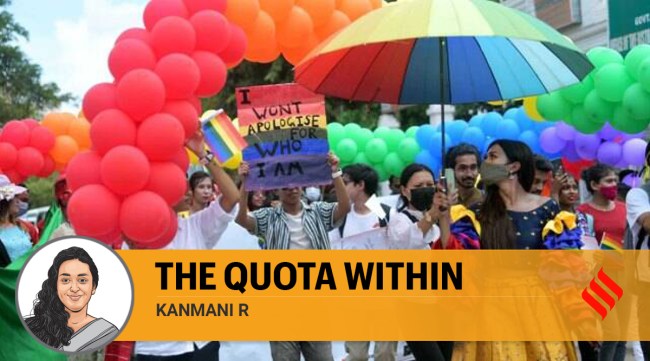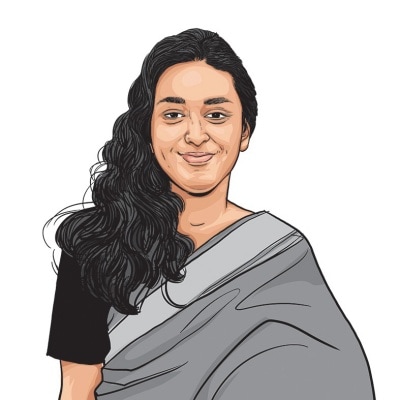Opinion Why transgender persons cannot be placed under the OBC category
SC or ST trans and intersex persons would then be considered under the OBC list, which is contrary to the reservation scheme under the Constitution
 Reservation is a tool to ensure the representation of underrepresented and structurally oppressed communities and the redistribution of public goods and resources. (Express photo)
Reservation is a tool to ensure the representation of underrepresented and structurally oppressed communities and the redistribution of public goods and resources. (Express photo) As Pride Month comes to a close, on June 27, transgender persons staged a protest in Mumbai in response to the Maharashtra government’s stand in the Bombay High Court. It said that it would be difficult to grant transgender persons horizontal and/or vertical reservations because it would breach the 50 per cent ceiling. Transgender persons in Tamil Nadu are also fighting for horizontal reservation in public job recruitment exams conducted by Tamil Nadu Uniformed Services Recruitment Board (TNUSRB), Teacher Eligibility Test (TET), etc. Why is this important? I hope to answer this by borrowing from the arguments made by Grace Banu, Disha Pinky Shaikh and other Dalit, Adivasi and indigenous queer, trans and intersex leaders and persons who have been fighting for reservation for transgender persons for over 15 years.
Reservation is a tool to ensure the representation of underrepresented and structurally oppressed communities and the redistribution of public goods and resources.
The Supreme Court in its judgment in NALSA v Union of India (2014) stated that, “We direct the Centre and the State Governments to take steps to treat them as socially and educationally backward classes of citizens and extend all kinds of reservation in cases of admission in educational institutions and for public appointments”. However, after nine years, the Union government and many state governments have not taken any step in this direction.
Rajya Sabha MP Tiruchi Siva’s Private Member Bill in 2015 (Rights of Transgender Persons Bill) had progressive provisions for reservation, but it was not passed in the Lok Sabha. However, the Transgender Persons (Protection of Rights) Act, 2019, as well as the 2020 Rules notified by the Union government, do not have any such provisions.
Education and jobs continue to remain inaccessible to most of us in the absence of mark concessions, age and physical requirement relaxations, scholarships and reservation. How is it equal opportunity when there is no recognition of the fact that our starting points are very different? We need substantive equality, not just formal equality. Due to the efforts of B R Ambedkar and other founding fathers, the former is guaranteed as a fundamental right in our Constitution.
For example, the Common Law Aptitude Test (CLAT) is an examination for admission to National Law Universities. The fee for a single attempt is between Rs 3,500 to Rs 4,000. How are transgender persons, often living hand to mouth due to the social stigma around them (owing to being disowned, denied employment, having to elope, etc.) expected to get this money? How are we expected to meet high cut-offs in most examinations (including NEET, the recent CUET, etc.) which don’t take into account that many among us don’t have resources and support in the first place? Cut-offs in entrance examinations are at best an arbitrary filter, they do not reflect the merit or potential of a student.
In 2018, I secured admission to an LL.B. course at the University of Delhi. Out of the 2,400 students who were admitted alongside me, I was the only openly trans person and law student in all three centres combined. I could get admission because of my caste-class privilege as a Brahmin/dominant caste person, access to resources and the fact that I had financial support from my family. How many trans persons have that? Even now, in 2023, DU does not have an equal opportunity policy and/or reservation policy for trans and intersex persons. In response to a question in Parliament, the Union government had submitted that there are “no transgender persons” as teaching and non-teaching staff in central universities.
However, a few state governments have taken steps to introduce vertical reservation for transgender persons. For example, in Tamil Nadu, we have been placed under the Most Backward Classes (MBC) list (2015). There is also a proposal to place us under the Other Backward Classes (OBC) list in Madhya Pradesh. This move is arbitrary and in violation of previous Supreme Court judgments. It also doesn’t make any sense.
First, this would mean that all transgender persons are being placed under a vertical category as a single class. How are we a single class when we are not homogenous in terms of the barriers we face? Transgender persons do not have a singular identity. There are variances based on caste, religion, ability, etc. Second, SC or ST trans and intersex persons would then be considered under the OBC list, which is contrary to the reservation scheme under the Constitution. Third, this would also mean that SC and ST trans and intersex persons would be forced to choose between reservation based on their caste or their tribal identity and reservation based on their gender identity.
Fourth, the whole point of reservation is to ensure representation and a share in state resources. What would be achieved, if all trans persons are clubbed together in one OBC or MBC list, denying the fact that SC and ST trans persons face further discrimination and structural barriers based on their caste or tribal identity?
By merely placing us under the OBC list, the state is forcing us to compete with each other and other cis-gendered persons in the category from various communities. This makes it almost impossible for us to get a fair shot or access to a job or a seat at a public institution, let alone equal opportunities. This would defeat the whole purpose of the reservation policy in the first place.
Horizontal reservation has been extended to persons with disabilities under the Right of Persons with Disabilities Act, 2016 and for women by certain state governments. So, this is not an unprecedented or unreasonable demand by any measure. The Supreme Court of India in the Saurav Yadav v State of Uttar Pradesh judgment (2020) as well as in Indra Sawhney v Union of India (1992) has talked about horizontal and vertical reservations.
Without such policies, every one of us who gets a job or a seat in an institution has had to do so through individual struggles and negotiations. Doesn’t the government have a responsibility to make structural changes, to ensure equality and social justice for all?
Finally, when I engage with students, I have always asked this question (borrowed from a friend): “How many of your classmates, friends, relatives, teachers or persons you worked with, worked for or who worked for you were trans persons?” Often, the answer is zero. Sometimes, it is one or two. Hopefully, you spare this question and our demand a thought.
The writer is a transgender woman and an advocate practising in the courts of Chennai


